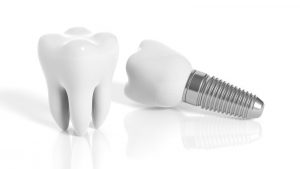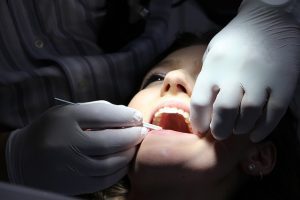Naturally, your teeth are important to you. A smile can’t only be beautiful; it’s got to be functional as well. Teeth can be easily taken for granted — maybe you stay up too late and skip brushing here or there, or maybe you haven’t seen a dentist in 10 years, just because. Ignoring your oral health seems like no big deal, until you’re missing one or more teeth. It’s easy to feel shame. How will the missing teeth affect your appearance, oral health, social life, and the ability to eat the foods you love?
If you lose a tooth, you need to consider tooth replacement; it’s critical to your dental health. Why? Well, leaving the space of the missing tooth empty can actually result in more damage, including gum infection, migration of other teeth, and even deterioration of the jaw bone.
Any dentist or oral surgeon will tell you the worst thing you can do for a missing tooth is nothing. Fortunately, there are a number of options for holistic tooth replacement. The right one for you depends on your unique situation, budget and preferences. Here are 5 options for tooth replacement, explained in detail:
Tooth Replacement Option #1: Dental Implant
A dental implant is the most popular option for holistic tooth replacement because it functions and looks every bit as good as a natural tooth. Dental implants are permanent. After you heal from the initial dental implant surgery, you might even forget the tooth is fake.
The root of the dental implant actually fuses with your jaw bone, basically becoming a natural part of your bite. It’s the only method of replacing teeth that truly replaces the tooth – both the crown and the root. And this is important because our teeth and our jawbone interact, stimulating and stabilizing each other. The actual implant itself replaces the root, and the crown replaces the tooth.
You can choose from zirconia or titanium dental implants, depending on your preference and the presences of any metal allergies. The maintenance of a titanium or zirconia dental implant is just like the maintenance of your natural teeth: good oral hygiene and regular dentist visits. And yes, same day dental implants are possible — if you have a healthy jawbone. Your oral surgeon can do an examination to determine if you are the right candidate.
But most dental implants require an extensive procedure, whether you have one done by a local dentist or a specialized oral surgeon. Your exposed roots will have to be replaced by metal screws, ideally in your jawbone, though perhaps placed on the gum line or cheekbone if there isn’t enough jawbone to work with. The implant will need to heal before the artificial tooth can be attached.
Even though it requires oral surgery and healing time, dental implants are by far your most effective approach to tooth replacement, because they’re closest to the real thing and they’re permanent.
Tooth Replacement Option #2: Dental Implant-Supported Bridge
A dental implant-supported bridge is your best option for tooth replacement if you are missing several teeth in a row. In this case, replacing each tooth with a dental implant would be exorbitantly expensive. Instead, an oral or maxillofacial surgeon would create a row of teeth that attaches to two dental implants located on either end. A bridge is every bit as effective and natural looking as a dental implant, but is more affordable if you are considering multiple teeth replacements that are next to each other.
However, unlike dental implants, the bridge will need replacing at some point — it’s not permanent. Any time a tooth socket is left empty, the jaw bone will deteriorate at that site. The implants stabilize the dental bridge on a visual and functional level, but if you’re missing several teeth in a row, two dental implants are not going to stop your jaw changing.
But implant-supported bridges are great: you don’t have to take it out at night, and it continually sits in your mouth, screwed into your jawbone, closely resembling your natural teeth. A dental implant-supported bridge is a natural, holistic solution to replace missing teeth.
Tooth Replacement Option #3: Tooth-Supported Bridge
Need an even more affordable way to replace multiple teeth adjacent to each other? Consider a tooth-supported bridge, in which the bridge is fitted on top of existing teeth, rather than being screwed via metal posts into your mouth. This approach is cheaper and doesn’t require invasive mouth surgery. Crowns slip over existing teeth next to the missing tooth/teeth and are cemented in place.
The catch with this procedure is the adjacent tooth on each end must be filed down to be fitted with crowns in order to avoid infection. Food can also slip under the fake teeth, so it’s important to thoroughly brush and floss to remove all excess debris regularly. We’d also recommend mouthwash.
Tooth-supported bridges look and feel more like your natural teeth than dentures, and last longer before they need replaced. So as a solution to replace missing teeth, a tooth-supported bridge does have its limitations — its main advantage is that it’s very affordable.
Tooth Replacement Option #4: Resin-Bonded Bridge
A resin-bonded bridge is used only to replace your front teeth. This type of bridge is relatively fragile and won’t survive the brute force your back teeth go through, but is fine for the front teeth. It consists of two wings that attach to the abutment teeth on the tooth surfaces nearest the tongue. The wings attach to the replacement tooth, or pontic.
The bridge requires healthy and strong abutment teeth, but there’s little modification to your existing teeth. Occasionally, we may remove a small amount of tooth enamel or roughen the surface of the tooth to create a stronger bond, but it’s no biggie. This is a cheaper alternative to a fixed bridge. It also will allow you to speak normally and it will restore your appearance. You’ll have some chewing power. Eventually, the bridge may pop off your teeth and will need to be replaced. Again, this option for teeth replacement does have its limitations, but is highly affordable.
Tooth Replacement Option #5: Removable Denture
Can’t afford dental implants to replace your teeth? You might consider removable partial or full dentures as an alternative. A partial denture only contains one or a few teeth. A full denture replaces all your teeth. Both are clasped in place rather than surgically attached to your mouth.
This is by far the cheapest option for tooth replacement. The catch is you have to take them out at night. They also need to be cleaned with special denture cleaning agents and a denture brush. You should have your dentures inspected regularly by your dentist. The other factor with this type of tooth replacement is that your mouth may move over time because there are only some (or no) teeth “anchoring” things in place. This means that every so often your dentures may stop fitting correctly and need to be replaced.
At Wilmington Oral Surgery, Dr. Puckett and his staff are advocated for our patients. That means we do everything we can to educate our patients on all their options for tooth replacement, oral surgery, full mouth reconstruction, or whatever other specialized oral procedures they may need. Often there are many options, no matter the issue. And we always do our best to make your financial path simple and achievable.










